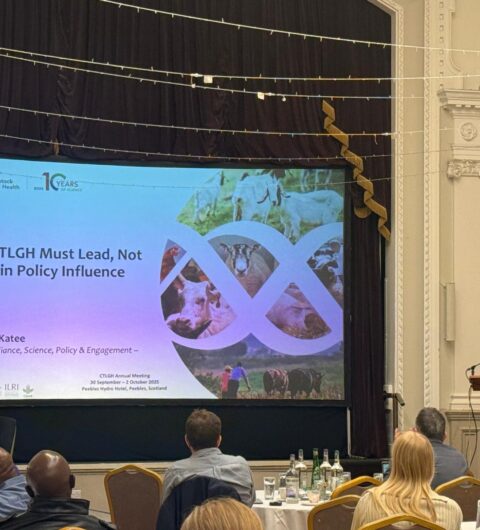
Speakers and delegates gather outside the Peebles Hydro Hotel at the start of the CTLGH Annual Meeting 2025
Since its first meeting in Naivasha, Kenya, in 2016, the CTLGH Annual Meeting has become a cornerstone event for collaboration and strategy in tropical livestock research and development.
“Over the past decade, CTLGH has transformed from a visionary idea into a global leader in tropical livestock research.
“Our focus now is to build on that foundation—turning science into tangible sustainable solutions that improve livelihoods smallholder farmers in low- and middle-income countries.”
Professor Mizeck Chagunda, CTLGH Director and Chair of Tropical Livestock Genetics at the University of Edinburgh.

Reflecting on a Decade of Science
The agenda for the first day celebrated CTLGH’s ten-year journey, highlighting milestone technologies, tools, and partnerships that have strengthened livestock resilience, productivity, and health across tropical regions. It also included sessions on expanding partnerships and our role in bridging research with real-world agricultural challenges.
Science, Policy, and Future Strategy
Days two and three consisted of in-depth science sessions on poultry, small-ruminants, and dairy genomics, reproductive technologies, cellular resources, and data-driven tools.
A standout discussion, ‘From Evidence to Influence,’ explored how CTLGH research can inform livestock policy and investment, ensuring science delivers real-world benefits for smallholder farmers.
Professor Chagunda presented an overview of the CTLGH Strategic Plan 2030, outlining the Centre’s roadmap for developing resilient and sustainable tropical livestock production systems through innovation, partnership, and policy engagement.

Looking Ahead
The final day included project updates, forward-planning discussions, and that summarised key lessons to guide future priorities. The meeting concluded with closing remarks celebrating the global partnerships at the heart of CTLGH’s success and reaffirming CTLGH’s mission to lead in tropical livestock research.
Commenting on the meeting, Dr. Wondmeneh Esatu, Scientist at the International Livestock Research Institute (ILRI), Ethiopia, said:
“It was an invaluable opportunity to share progress, exchange ideas, and refine the solutions we deliver to smallholder farmers,” noting the success of CTLGH–ILRI collaborations such as the improved Tilili chicken in Ethiopia.
In Conclusion
Throughout the week, the science was accompanied by social and networking opportunities which culminated in a gala dinner and traditional Scottish ceilidh, underscoring the spirit of community that underpins CTLGH’s global network.
- Ten years of impact in tropical livestock genetics and health research.
- Advancement of the CTLGH Strategic Plan 2030, shaping future priorities.
- Focus on evidence-based policy, linking research to real-world outcomes.
- Strengthened partnerships across science, development, and investment communities.
